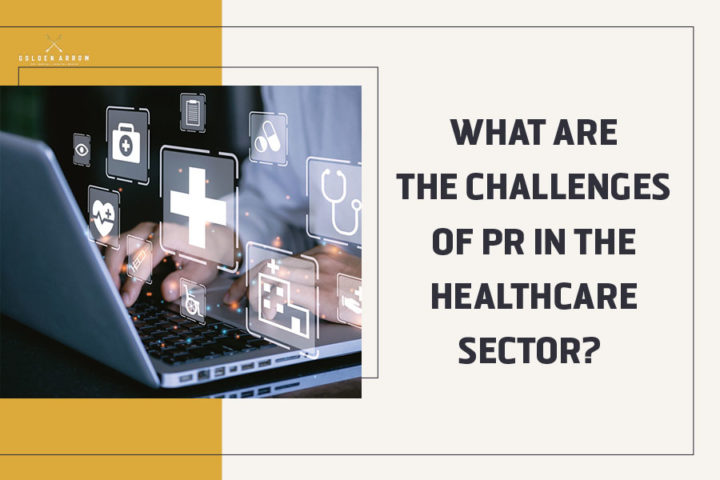Public relations is vital to building a successful brand in the healthcare sector. PR helps with brand visibility, reaching clients, and building positive relationships with the public. But what are the challenges of PR in the healthcare sector?
The healthcare field is highly specialized, meaning there are many barriers to effective healthcare PR strategies. PR professionals must navigate strict regulations to ensure the medical PR strategy doesn’t violate them.
As a highly experienced healthcare PR agency, here at Golden Arrow, we have the know-how to help create a successful PR strategy despite the challenges.

What Are the Challenges of PR in the Healthcare Sector?
Medical PR strategies are crucial to building new and existing healthcare brands. You can only position your brand as a trusted resource with a positive relationship with the public, especially your target audience.
Because healthcare affects everyone, your brand needs the best healthcare PR company to help build brand visibility. Golden Arrow is among the best PR agencies; we have extensive experience working with startups and existing health brands.
Our experience enables us to tackle and navigate the challenges that brands in the healthcare industry encounter. Some of the problems in medical PR include the following:
- Regulatory constraints
- Patient confidentiality and privacy
- Crisis management and reputation risks
- Media landscape and digital communication
- Healthcare misinformation
Regulatory constraints and compliance issues
The healthcare sector is a highly specialized industry governed by strict regulations. These strict regulations in the health sector are challenges that PR professionals must navigate carefully. Health PR professionals must comply with the regulations impacting communication.
We understand the responsibility of appropriately delivering your brand’s message and in compliance with medical regulations. When developing a PR strategy, our team ensures that it follows each established regulations regarding communication.
Maintaining patient confidentiality and privacy
Reputable PR agencies ensure to handle their client’s PR campaigns with full transparency while protecting patient privacy. Failing to protect patient privacy will lead to a negative public perception of a healthcare brand.
When delivering your message or services, it is vital to maintain your clients or patients’ confidentiality. HIPAA regulations exist to protect patients by preventing the disclosure of their private information to the public.
PR teams must navigate HIPAA regulations carefully as their violation leaves their client vulnerable to lawsuits besides a negative reputation.
Crisis management and reputation risks
Healthcare PR strategies help brands handle public perception during a crisis. The biggest challenge during crisis management is reacting fast enough to maintain public trust.
If healthcare crises are not handled efficiently, the public may start having a negative view of the brand. This will lead to mistrust, and it may be challenging for a brand to regain public trust.
Evolving media landscape and digital communication
In the developing media landscape, the best way for brands to reach wider audiences is by establishing proper digital communication. Social media platforms have become a crucial part of successful PR campaigns.
Most people use various platforms, so when brands establish their online presence, they can establish a channel for digital communication with their audience.
The challenge brands face here is catching the attention of their target audience due to the competition. To combat this, PR professionals must develop strategies that will bring in the audience to their client’s online platforms.
Online platforms are also great for healthcare brands to share successful patient stories. This broadcasts patient satisfaction to the target audience, allowing a brand to nurture a positive brand image.

Addressing healthcare misinformation
One of the disadvantages of social media is that misinformation spreads easily. Healthcare PR strategies aim to combat the misinformation and myths that may be spread among the public.
Misinformation leads to the public developing distrust towards healthcare brands in general. If you are building your healthcare brand, you want to position yourself as a credible source of healthcare information for the public. The best way to achieve this is through a successful PR campaign.
To position their clients as credible sources, PR professionals must ensure their PR campaign includes several information channels to communicate with the target audience.
Sharing truthful information and educating your audience positions your brand as a thought leader. This means the public will seek out your brand as a trusted source when they need medical information or services.
Strategies and Solutions
Collaborative efforts with regulatory bodies
You must be mindful of governing regulations for a successful medical PR campaign. Ensuring compliance is best done through collaborative efforts with regulatory bodies.
For example, the FDA is one regulatory body that sets rules and guidelines for medications and certain healthcare services. You can build a positive reputation if your marketing efforts meet the regulations.
Emphasis on ethical communication practices
Ethics is integral in healthcare. This is why healthcare strategies must ensure ethical communication practices. Open and transparent communication between you and your clients, patients, and stakeholders fosters a trusting relationship while ensuring there is no misinformation.
Brands that do not emphasize ethical communication may quickly lose the public’s trust and support.
Building robust crisis communication plans
Every healthcare brand needs a crisis management plan prepared for prompt reaction if problems arise. The primary purpose of crisis management is to protect the reputation and maintain public trust.
Another crucial step when preparing for potential crises is staff training. Healthcare brands with crisis management trained staff ensure they have a proper and prompt response in case of a potential crisis.
Dealing with the issues as soon as they arise may minimize the potential reputational risks for the brand.
Leveraging social media
Online platforms have opened more opportunities for healthcare brands to build positive relationships with the public. Our Golden Arrow PR team ensures the incorporation of technology for effective communication.
Effective PR strategies also involve monitoring your social media accounts to engage with and respond to the public leaving comments on your posts.
Educating the public and stakeholders
Educating the public and your stakeholders about your brand’s new ventures and mission ensures they are in step with your brand’s vision. For example, one way to educate the public is by promoting health literacy.
Share facts and healthcare-related information that the public may be unaware of. It is also highly beneficial to engage in public awareness campaigns. These campaigns can help you raise awareness about specific issues in healthcare.
Such involvement may help cement you as a credible source among the public and even attract new clients.

Conclusion
What are the challenges of PR in the healthcare sector? As mentioned above, the challenges healthcare PR professionals face involve several aspects. Some of them are the regulatory constraints, maintaining patient confidentiality, and combating misinformation.
PR professionals skillfully navigate these challenges to build a successful PR campaign for their clients. They use creativity, adaptability, and strategic thinking to overcome obstacles.


